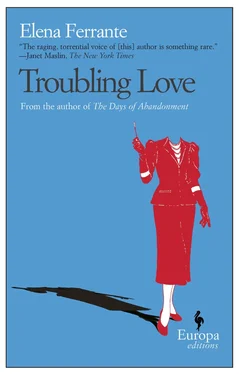He protected her from other men violently, but whether it was a violence that would crush only rivals or would be turned against himself, fatally, I never knew. He was an unsatisfied man. Maybe he had not always been but had become so since he had stopped roaming the neighborhood, getting along by decorating shop counters or carts in exchange for food, and had ended up painting, on canvases not yet fixed to frames, landscapes, seascapes, still-lifes, exotic lands, and armies of Gypsies. Who knows what destiny he had imagined for himself; he was furious because life didn’t change, because Amalia didn’t believe that it would change, because people didn’t appreciate him as they should. He repeated constantly, to convince himself and to convince her, that my mother had been very lucky in marrying him. She was so dark you didn’t know what blood she came from. He, however, who was fair and blond, felt in his blood something special. Although he stuck unrelentingly to the same colors, the same subjects, the same countryside, and the same sea, he fantasized without restraint about his abilities. We, his daughters, were ashamed of him and believed that he might hurt us as he threatened to do to anyone who touched our mother. When he was on the tram, too, we were afraid. In particular, he kept an eye on short, dark, curly-haired men, with thick lips. He attributed to that anthropological type a desire to steal Amalia’s body; but perhaps he thought that it was my mother who was attracted by those square, strong restless bodies. Once he was certain that a man in the crowd had touched her. In front of everyone he slapped her: in front of us. I was painfully astonished. I was sure that he would kill the man, and I didn’t understand why, instead, he hit her. Even now I didn’t know why he had done it. Maybe to punish her for having felt in the fabric of her dress, on her skin, the warmth of that other body.
With the bus unmoving in the chaos of Via Salvator Rosa, I discovered that I no longer felt any sympathy for the city of Amalia, for the language in which she spoke to me, for the streets that I had walked as a girl, for the people. When at a certain point there appeared a glimpse of the sea (the same that had excited me as a child), it seemed to me purple parchment pasted over a crack in a wall. I knew that I was losing my mother definitively and that it was exactly what I wanted.
The Vossi sisters’ shop was in Piazza Vanvitelli. As a girl I had often stopped in front of the sober windows, their thick panes of glass enclosed in mahogany frames. The entrance had an old door whose upper part was glass, and at the top were incised the three “V”s and the date of the shop’s founding, 1948. I didn’t know what was beyond the glass, which was opaque: I had never had either the need to go and see or the money to do so. I had often stopped outside because I especially liked the corner window, where women’s garments were carelessly placed beneath a painting that I wasn’t able to date, but that was certainly by a skilled artist. Two women, so close and so identical in movement that their profiles were almost superimposed, were running openmouthed, from the right side of the canvas to the left. You couldn’t tell if they were following or being followed. The image seemed to have been cut away from a much larger scene, and so only the left legs of the women were visible and their extended arms were severed at the wrists. Even my father, who had some objection or other to every painting that had been made in the course of the centuries, liked it. He invented stupid attributions, pretending to be an expert, as if we all didn’t know that he hadn’t been to any kind of school, that of art he knew little or nothing, that all he could paint, night and day, was his Gypsies. When he was in the mood and disposed to boast more than usual with us, his daughters, he even attributed it to himself.
It was at least twenty years since I had had occasion to go up the hill, to this place near the castle of San Martino that I recalled as cool and clean, different from the rest of the city. I was immediately vexed. The piazza seemed to me changed, with its few spindly plane trees, encroached on by the steel bodies of cars, and overhung by a scaffolding of yellow-painted iron beams. I recalled that at the center of the piazza of long ago were palm trees that had seemed to me very tall. There was one, a sickly dwarf, besieged by the gray barriers of the construction. Furthermore, I couldn’t at first glance find the shop. Tailed by my uncle, who was continuing with himself the argument he had been having with the people on the bus, even though it had occurred an hour earlier, I circled the space: dust-filled, noisy, bombarded by horns and pneumatic drills, beneath a cloudy sky that seemed to want to rain and couldn’t. Finally I stopped in front of some wigless female mannequins in underpants and bras, carefully positioned in bold, even vulgar, attitudes. Among mirrors, gilded bits of metal, and fabrics in electric colors, I had difficulty recognizing the three “V”s in the arch of the door, the only thing that remained the same. Even the painting I liked was no longer there.
I looked at my watch: it was ten-fifteen. The activity was such that the whole piazza — buildings, gray-violet colonnades, clouds of sounds and dust — seemed a merry-go-round. Uncle Filippo glanced at the display windows and immediately turned away in embarrassment: too many spread legs, too many provocative breasts, he’d have ugly thoughts. He said that he would wait for me on the corner: that I should be quick. I said to myself that I hadn’t asked him to come with me, and I went in.
I had always imagined that, inside, the Vossi sisters’ shop was dim, and inhabited by three genteel old ladies, wearing long dresses and thick strands of pearls, their hair gathered in chignons held by old-fashioned hairpins. Instead I found bright lights, loud customers, mannequins in satin nightgowns, camisoles in many colors, silk underpants, counters and tables that overloaded the place with merchandise, heavily made-up young salesgirls, all wearing tight pistachio-colored uniforms with the three “V”s embroidered on the chest.
“Is this the Vossi sisters’ shop?” I asked one of them, the one who looked the nicest, perhaps uneasy in her uniform.
“Yes. May I help you?”
“Could I speak with one of the Miss Vossis?”
The girl looked at me, bewildered.
“They’re not here anymore,” she said.
“Are they dead?”
“No, I don’t think so. They’ve retired.”
“Did they give up the shop?”
“They were getting on, they sold everything. There’s new management now, but the label is the same. Are you an old customer?”
“My mother was,” I said. And I slowly began to take from the plastic bag that I had brought with me the nightgown, the two dresses, the five pairs of underpants found in Amalia’s suitcase, spreading out everything on the counter. “I think she bought them all here.”
The girl looked with expert eyes.
“The things, yes, they’re ours,” she said with a questioning air. I saw that she was trying to guess my mother’s age based on how old I seemed to be.
“She’ll be sixty-three in July,” I said. Then it occurred to me to lie: “They weren’t for her. They were gifts for me, for my birthday. I was forty-five on May 23rd.”
“You look at least fifteen years younger,” the girl said, trying to do her job.
In an engaging tone, I explained:
“The things are beautiful, and I like them. Only, this dress binds a little and the panties are tight.”
“Do you want to exchange them? I’d need the receipt.”
“I don’t have the receipt. But they were bought here. Don’t you remember my mother?”
Читать дальше












